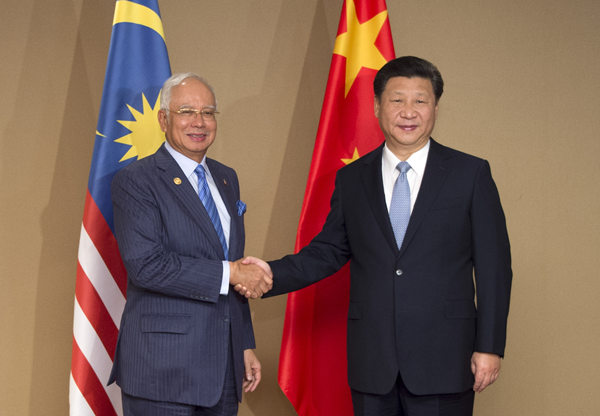 |
|
Chinese President Xi Jinping (R) meets with Malaysian Prime Minister Najib Razak in Manila, the Philippines on November 17, 2015. [Photo/Xinhua] |
Reports that Chinese and Malaysian businesses are researching a port expansion project at Port Klang in Malacca, if confirmed, would suggest another step in advancing the Belt and Road Initiative, which aims to boost trade and connectivity across Asia, Europe and Africa.
Expansion of the port is certainly necessary, as Malaysia's largest port in the Strait of Malacca has seen its handling capacity nearly saturated in its existing port areas.
And cooperation between the two countries on the project would be natural, not only because Chinese technology and expertise in port construction have been outstanding in the global sector, but also because Malacca is a major stop on the 21st Century Maritime Silk Road that China is looking to create with other countries.
Compared with some similar overseas projects that have stalled due to political and social hurdles, the prospects this time would seem brighter thanks to demands from both sides' industries.
A Malaysian newspaper cited the country's Transport Minister Liow Tiong Lai as saying that outside businesses are welcome to invest in the expansion project.
Also, there should be a firm foundation of trust, as Port Klang already has well-established sister-port relationships with major ports in China such as Dalian, Ningbo and Guangzhou.
Talk of such cooperation on infrastructure should come as no surprise, as China is now the largest trading partner for some 130 economies, and is on its way to becoming the largest source of outbound direct investment, a big proportion of which is in countries along the routes of the 21st Century Maritime Silk Road and the Silk Road Economic Belt.
The Belt and Road Initiative, as they are collectively known, has become China's largest diplomatic endeavor, and it has been warmly received by countries along the routes, as it meets the needs of developing countries in their pursuit of economic growth, especially their need for investment in infrastructure.
China's own experience shows a modernity drive will not go far without the infrastructure to support it, and it boasts proven infrastructure building capacity, as evidenced by its high-speed railways, for example.
So far dozens of countries have officially agreed to join hands with China to turn the cross-continent cooperation plan into reality, and the mooted cooperation with Malaysia to expand Port Klang is just the latest manifestation of this common desire for a community of win-win cooperation.